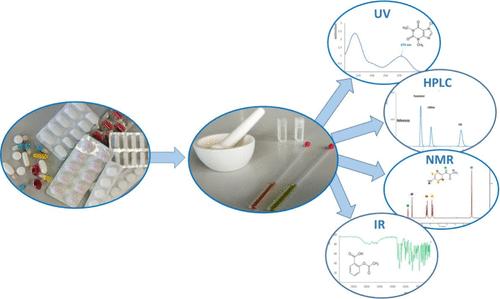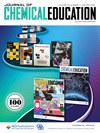本科生实验中应用于止痛片的辅助仪器技术
IF 2.5
3区 教育学
Q2 CHEMISTRY, MULTIDISCIPLINARY
引用次数: 0
摘要
仪器分析实验室通常为学生提供几个互不关联的实验。为了让学生更合理地了解最常用的仪器技术,我们开发了一个新的实验。实验选取了市场上销售的止痛药,也就是我们熟悉的消费品,其中含有一至三种有效成分,即对乙酰氨基酚(扑热息痛)、乙酰水杨酸(ASA)和咖啡因。比较了常用分析方法对未知药片进行定性和定量分析的性能:这些分析方法包括紫外-可见光谱法(UV-vis)、红外光谱法(IR)、核磁共振光谱法(NMR)以及高效液相色谱法(HPLC)。学生们成功地揭示了配方的组成,这些配方分为三个难度类别。学生们了解到,除了理论课上处理过的简单混合物,复杂药物产品的成分也可以揭示出来。通过比较不同技术的性能,学生加深了对复杂混合物的理解,并比较了分析方法的效率。实验室实验可根据研究生水平进行调整,加入方法优化、验证和二维光谱技术等额外任务。本文章由计算机程序翻译,如有差异,请以英文原文为准。

Complementary Instrumental Techniques Applied to Pain Relieving Tablets in an Undergraduate Laboratory Experiment
Several unconnected laboratory experiments are usually offered for students in instrumental analysis lab. To give the students a more rational overview of the most common instrumental techniques, a new laboratory experiment was developed. Marketed pain relief drugs, familiar consumer products with one to three active components, namely, acetaminophen (paracetamol), acetylsalicylic acid (ASA), and caffeine, were selected. Common analytical methods were compared regarding the performance of qualitative and quantitative analysis of unknown tablets: UV–visible (UV–vis), infrared (IR), and nuclear magnetic resonance (NMR) spectroscopies, as well as high-performance liquid chromatography (HPLC). The students successfully uncovered the composition of formulations, which were divided into three difficulty categories. Students were shown that in addition to simple mixtures handled in theoretical classes, the composition of complex drug products can also be uncovered. By comparing the performance of different techniques, students deepen their understanding and compare the efficiency of analytical methods in the context of complex mixtures. The laboratory experiment can be adjusted for graduate level by including extra tasks such as method optimization, validation, and 2D spectroscopic techniques.
求助全文
通过发布文献求助,成功后即可免费获取论文全文。
去求助
来源期刊

Journal of Chemical Education
化学-化学综合
CiteScore
5.60
自引率
50.00%
发文量
465
审稿时长
6.5 months
期刊介绍:
The Journal of Chemical Education is the official journal of the Division of Chemical Education of the American Chemical Society, co-published with the American Chemical Society Publications Division. Launched in 1924, the Journal of Chemical Education is the world’s premier chemical education journal. The Journal publishes peer-reviewed articles and related information as a resource to those in the field of chemical education and to those institutions that serve them. JCE typically addresses chemical content, activities, laboratory experiments, instructional methods, and pedagogies. The Journal serves as a means of communication among people across the world who are interested in the teaching and learning of chemistry. This includes instructors of chemistry from middle school through graduate school, professional staff who support these teaching activities, as well as some scientists in commerce, industry, and government.
 求助内容:
求助内容: 应助结果提醒方式:
应助结果提醒方式:


